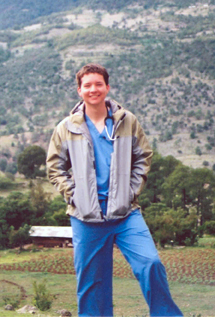By Katie Rice
Hendrix College Freshman
 CONWAY, Ark. (Sept. 13, 2006) - Hendrix College students will get a chance next month to apply for grant funds that will allow them to design out-of-the-classroom projects for the spring semester that might be a chance of a lifetime to work on a research project that helps find a cure for cancer, produce a documentary film or perform at Carnegie Hall.
CONWAY, Ark. (Sept. 13, 2006) - Hendrix College students will get a chance next month to apply for grant funds that will allow them to design out-of-the-classroom projects for the spring semester that might be a chance of a lifetime to work on a research project that helps find a cure for cancer, produce a documentary film or perform at Carnegie Hall.
For T.C. Elliott, a Hendrix sophomore from the small town of Pyatt, Ark. (population 253), funding from Hendrix's Odyssey Program allowed him the chance to become one of the first Americans ever to visit the remote, rural villages of southern Mexico.
Elliott, a pre-med biology major, traveled through the state of Oaxaca for a month this summer as a member of a Global Frontier Missions mobile medical unit.
"When you go down there as an American, they look at you as a god and they put you on a pedestal," said Elliott. "They looked at me as a doctor from America, so they expected for me to be able to cure all of their illnesses, all of their ailments, and really do a lot of good. That's a daunting task for anyone, but especially for an 18-year-old."
Elliott is no stranger to medicine, though. Since age 16, he has worked as a first responder in north Arkansas' Marion County. At 17 he started taking Emergency Medical Technician (EMT) training classes at night, and he also volunteered with a local ambulance service during summers and weekends. He passed the EMT national registry exam at 18 and is now a licensed medical professional.
Elliott spent about a week in each of four Mexican villages, working 10-hour days with little or no break. Global Frontier Missions sends out mobile medical units about once per year, and otherwise there is no professional medical care for the villagers.
"When [units] do come in, everyone floods in," Elliott said. "They bring their family, their children. Even if there's nothing wrong, they still want to be a part of this, because this is something that's huge to their village. They come to see these Americans and see these weird things that we put in our ears and put up to their hearts. To them it's intriguing, and they get a good laugh out of it."
The main complaints Elliott heard involved musculoskeletal problems from working long hours in the fields. Diabetes was also rampant - Elliott estimated that 85 to 90 percent of the patients he saw had the disease - because the villagers drink soft drinks rather than the bacteria- and parasite-infested water near their villages. Cavities and high blood pressure also affect many villagers.
The medical unit brought thousands of dollars of medical supplies, but a main tool was education.
"The medication that we had was only going to last for 28 days, and when it's out, it's gone," said Elliott. "And once we're gone, there's no one there to diagnose their problems. So a lot of what we try to do is educate the patient: teach them how to boil their water, teach them how to brush their teeth to prevent cavities. That way their teeth don't hurt, so they can actually eat something, so they don't get malnourished."
Elliott's trip was funded by the Hendrix Odyssey Program, a curricular program that gives students and faculty the chance to participate in self-designed experiential learning projects at home and abroad. Elliott applied for and received full funding for the trip, which paid for his travel expenses and also bought medical supplies. In addition, Conway Interfaith Clinic donated thousands of dollars' worth of supplies.
"I have to give thanks to the Odyssey office, because without their funding the trip itself wouldn't have been possible," said Elliott. "My trip was more than just an opportunity to serve others. It unexpectedly served to refresh my steadfast dedication to becoming a physician; it expanded my view of indigenous cultures; and it opened my eyes to the harsh living conditions that millions have to endure. The trip was such a positive experience because it ignited a willingness and desire to give to those who are less fortunate than I am."
Hendrix, founded in 1876, is a selective, residential, undergraduate liberal arts college emphasizing experiential learning in a demanding yet supportive environment. The college is among 150 colleges featured in the 2007 edition of the Princeton Review America's Best Value Colleges. Hendrix has been affiliated with the United Methodist Church since 1884. For more information, visit www.hendrix.edu.
- 30 -
Media contact: Judy Williams, 501/450-1462, williamsj@hendrix.edu